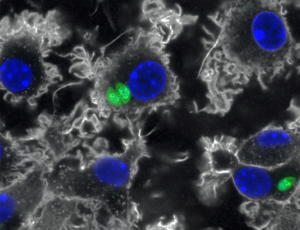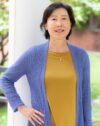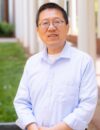Immunology
About

Toxo BMDC. Courtesy of Sarah Ewald
The research groups in Immunology investigate how the immune system develops, how it functions, and how it becomes dysregulated and/or leads to disease. Their interests encompass basic mechanisms at the molecular, cellular, and whole organism levels, and translation of discoveries into the clinic. Immunology is an inherently translational science, and Immunology research in MIC is oriented towards infectious diseases, cancer, autoimmunity, allergic disease, inflammation, immune system development, vascular biology, and neuroscience. Research questions that Immunology faculty in MIC are addressing include:
- What processes control the development of immune cells?
- What signals are activated in the immune system by microbes and tumors? How do these signals determine the quality and function of the immune response?
- Why is the immune system unable to control some viruses, bacteria, protozoan parasites, and tumors? What can we do to augment immune control?
- How is self-tolerance established and maintained? How and why does autoimmune disease develop?
- Why do allergic responses develop against innocuous substances? How can we alter the development of these responses to minimize allergies?
- How does the immune system mediate chronic inflammation and tissue repair?
Programs and Centers
These research questions are enriched by a network of Centers and Programs at UVA that bring Immunology researchers in MIC in contact with colleagues in other departments and disciplines, including:
- The Carter Immunology Center
- The Center for Immunity, Inflammation, and Regenerative Medicine
- The Center for Brain Immunology and Glia
- The UVA Comprehensive Cancer Center
- The Immunology Training Program, which is supported by an NIH-sponsored Immunology Training Grant for both pre- and post-doctoral trainees
These Centers and Programs are inclusive, and reflect the strongly collaborative and collegial environment of the University of Virginia. Through their individual program activities, they increase the breadth of immunologically-related activities. Collectively, they create a rich intellectual environment where trainees are exposed to cutting-edge technologies and a range of disciplines and ideas that support productive research careers in Immunology.
Primary MIC Immunology Faculty members

Engelhard, Victor H.
Identification of MHC-restricted tumor antigens / Control of T cell homing to tumors / Tertiary lymphoid structures and intratumoral immunity

Ewald, Sarah E
Innate immunity, chronic disease, host-parasite interactions, Toxoplasma gondii, proteomics

Rutkowski, Melanie
Influence of commensal microbes on immune homeostasis, anti-tumor immunity, and metastasis

Zegarra-Ruiz, Daniel Fernando
Unraveling the role of host microbe interactions in autoimmune diseases






